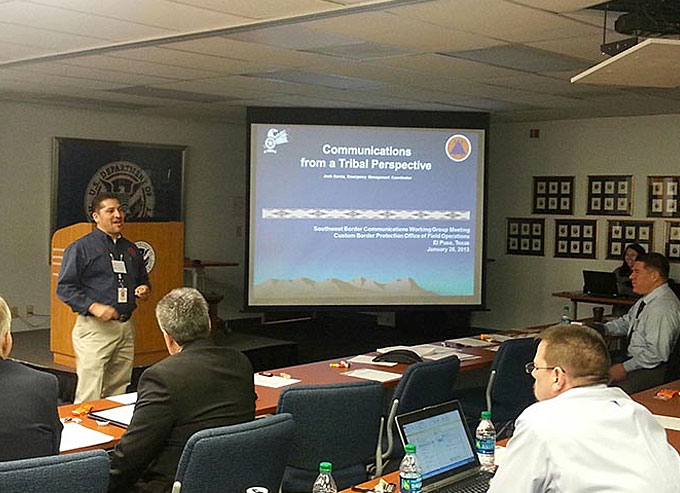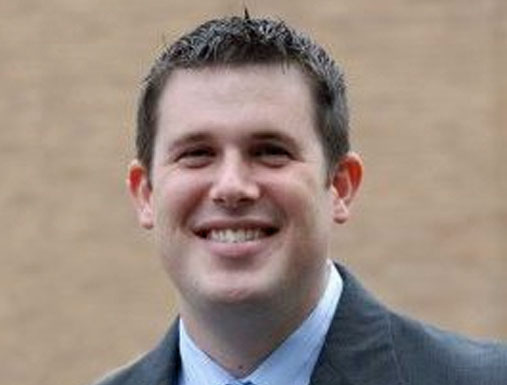An Unparalleled Community needs an Uncommon Network
By Margaret Gutierrez, FirstNet Regional Tribal Government Liaison
The Ysleta del Sur Pueblo tribe refers to the layout of its tribal lands as a checkerboard—with miles and sometimes hours of travel separating one tribal area from another.
Nearly 2,000 tribal members live on Ysleta del Sur Pueblo’s lands, residing in a community that sits within the city limits of El Paso, Texas, and another located outside the city but still within El Paso County.
The tribe also owns a 70,000-acre ranch, which is two-and-a-half hours from El Paso, near the U.S. border with Mexico, in addition to property near the Hueco Tanks State Park and Historic Site.

When I traveled with AT&T staff to meet with members of the Ysleta del Sur Pueblo, our goal was to spend time getting to know the community and understanding the needs of tribal first responders who serve in this diverse checkerboard of lands.
We heard from Ysleta del Sur Pueblo about their challenges and resources, the strong ties the tribe has formed with surrounding jurisdictions and agencies, and its desire to honor and retain its status as a sovereign nation.
As we visited with the Ysleta del Sur Pueblo, we wanted to understand how FirstNet could help this small community with complex needs.
Understanding the Pueblo’s Needs
During our day with Ysleta del Sur Pueblo, we got the chance to see the vast beauty of the ranch where the tribe runs a small cattle operation and owns a guesthouse that tribal members can use as a retreat.
The ranch’s remote location near the Mexican border can bring hazards onto the ranch and a sometimes-acute need for emergency communications capabilities.

“At the ranch,” says Josh Garcia, Emergency Management Coordinator for Ysleta Del Sur Pueblo, “our concern is for whenever there may be an enhanced need for communications.
If we are having a wildland fire there or if there is a big influx of human trafficking or drug trafficking, that’s when more attention would be needed to the quality of coverage we have.”
For these situations, Garcia says the only communication currently available is through land mobile radios that have limited line-of-site range on the ranch.
Tribal public safety officers can connect with U.S. Customs and Border Patrol agents in the area, but under the same line-of-site limitations.
AT&T’s Brian Maholic, who does outreach for the FirstNet program in Texas, was with us on that visit.
He noted that tribal public safety personnel are left without a lot of options if they encounter someone who may be dangerous or who is in medical distress after traveling a long distance to cross the border.

“How do you call for help?” he asks.
In the population centers where most of the tribal residents live, Garcia says their land mobile radio coverage is strong, and they are actively working with the neighboring communities and agencies to improve interoperability.
Using LTE for communications and data sharing is not something tribal public safety has yet adopted.
“As far as broadband, it’s something that we are just starting to consider with FirstNet,” Garcia says.
A New Opportunity with FirstNet
Congress created FirstNet in 2012 to ensure the building, deployment, and operation of a nationwide broadband communications network for public safety.
In March of this year, FirstNet entered into a public-private partnership with AT&T to build out the network.
AT&T brings its existing infrastructure, innovation and customer service experience to the public-private partnership, along with substantial additional investments to boost coverage for FirstNet users.
FirstNet will provide government funds, 20MHz of powerful wireless spectrum, and dedicated oversight to ensure the needs of public safety remain at the forefront of all network decisions.
(The U.S. southern border continues to be one of the largest challenges for public safety operations at all levels of government. The dynamic mission space, coupled with the remote landscape and environmental factors, challenges technology delivery of just about any sort. This video on the subject highlights some of the key issues facing public safety operations along the southwest border. Courtesy of FirstNet and YouTube)
Once in a public-private partnership, AT&T and FirstNet worked together to take years of data and input gathered from consultation with public safety to issue customized State Plans to U.S. states and territories.
The State Plans show how FirstNet and AT&T propose to build out the network within each state and territory.
We believe opting in is the most time and cost-effective choice states and territories can make to ensure the network is deployed quickly and is truly available nationwide.
Once the governor of a state or territory has opted in, public safety agencies can choose whether or not to subscribe to FirstNet.
Maholic says one of the biggest differences with FirstNet is that public safety agencies will have a powerful voice in the relationship with AT&T.
“The reason is because FirstNet holds AT&T accountable for everyone,” Maholic says about the company’s commitment to public safety agencies of every size.
This commitment is invaluable for all of public safety, but it really marks a new opening for tribal entities.
FirstNet’s founding legislation mandated that consultation activities be coordinated through a state or territory single point of contact (SPOC).
(Learn More. Courtesy of FirstNet and YouTube)
Some states, like Texas, did an excellent job of sharing information and including tribal nations in FirstNet planning activities; others were not as successful.
Now that the State Plan consultation process has been completed, tribal entities can establish a more direct relationship with AT&T and FirstNet.
FirstNet’s Tribal Working Group, part of our Public Safety Advisory Committee, contributed to drafting a Tribal Consultation Policy that has been approved by FirstNet leadership and codifies FirstNet’s commitment to this relationship going forward.
Tribal entities can reach out to me or to my colleague, Adam Geisler, to begin or continue a conversation about FirstNet.
Similarly, AT&T has personnel like Brian Maholic who are available, following state opt-in, to work with tribes across the country to discuss how the FirstNet state plan can meet their needs now and in the future.
FirstNet for Tribal Public Safety
Maholic says AT&T’s goal in the original meeting with Ysleta del Sur Pueblo and the scheduled follow up sessions is to understand their needs and show them what the AT&T network does today.
“We want to be aware of their areas of operation and their areas of non-operation,” Maholic says.
He stresses that AT&T would not want their coverage to be a less robust solution than any other current option.
“We are expanding the network,” Maholic says. “We are expanding the network heavily.”

The important questions then become; “Are those areas of expansion helpful and what are the timelines?”
Can AT&T provide coverage across Ysleta del Sur Pueblo’s lands so they have that connection when they need it most?
Going beyond coverage, FirstNet and AT&T want to understand how Ysleta del Sur Pueblo will use the network.
Right now, Garcia says tribal public safety personnel use a mobile data application for background investigations and are beginning to explore what it would take to deploy a CAD system for tribal public safety agencies.
Although the tribe has strong relationships with the neighboring city and counties, Garcia emphasizes that the tribe is somewhat reluctant to link to another system.
The tribe is a sovereign government and the principles of self-determination and sovereignty are fundamental.
“How can we stay true to that and make sure we can still function and exist with our capabilities, on our own?” Garcia asks.
Brian Maholic stresses that FirstNet can be a real game changer here as the network provides the backbone on which to run systems that meet the tribe’s needs.
“If you share neighborhood CAD systems, you become tightly interdependent,” Maholic says.
With FirstNet, the tribe can procure the system based on an evaluation of its needs.

Maholic explains that FirstNet uses economies of scale to drive down the cost: “FirstNet is a nationwide approach to a complex problem.”
“If you took the same complex problem and you made it local and you just solved it for tribes or rural areas and then you solved it differently for cities and counties it would be prohibitively expensive.”
Essentially, Maholic says, FirstNet can provide Ysleta del Sur Pueblo or any agency a way to meet its public safety needs without having to build a system, maintain it, and hire or train a staff of system experts.
Applications and tools offered and validated through FirstNet could also provide easier access at a more affordable cost.
Garcia and other Ysleta del Sur Pueblo leaders are taking a wait and see approach.
They are interested in seeing what FirstNet can offer and in learning more over the course of several scheduled meetings with FirstNet and AT&T.
He says that each tribe is going to be different, but speaking for his tribe, he stressed that FirstNet should “look at what tribes have to offer—regardless of their size.”
“Tribes have the ability to move a little quicker than other types of governments,” Garcia said. “Listen to the tribes on the assets they have to offer and what their needs are.”
As FirstNet and AT&T move into the deployment of the network, we are eager to help tribal entities benefit from all FirstNet can offer.
I see an opportunity for tribal public safety agencies to work with FirstNet and AT&T in a different way than they have worked with carriers before.
FirstNet and AT&T are ready and willing to engage in discussions on needs and resources, coverage and costs, systems and tools. Let’s have the conversation.
Learn More…
Unanimous Opt-Ins Pave Way for FirstNet (Learn More, Multi-Video)

















